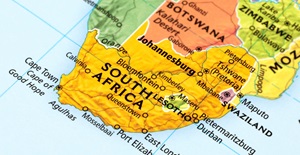This was certainly not always the case: South Africa has a major rail network spanning the country, and is responsible for the majority of rail traffic on the African continent. Now, steps are underway to try to revive what the rail industry can do to support the country's economic recovery.
Co-written by Reuben Cronjé of Pinsent Masons.
Announcing South Africa's Economic Reconstruction and Recovery Plan (38-page / 1.6MB PDF), president Cyril Ramaphosa said that the government will be "promoting greater private sector participation in rail, including through granting third-party access to the core rail network and the revitalisation of branch lines".
The president's statement is an important indicator that the future of the rail sector in South Africa will involve a stronger move towards liberalisation and open rail network access. This matches the trend in other network services, such as an electricity sector that is relying on significant participation from independent power producers (IPPs) to ensure grid stability and provide a sizeable portion of future electricity supply.
South Africa's rail network has until now been dominated by state monopolies. Up until the early 1990s, the South Africa Transport Services (SATS) was the state entity responsible for all freight and passenger rail in South Africa, including the rail network. Rail was concentrated into a single government monopoly. Following the Legal Succession to the South African Transport Services Act of 1989, SATS' assets were split between two different entities:
- Transnet – the state entity responsible for freight rail, amongst other things, and which assumed ownership of the vast rail network largely outside of urban areas; and
- Passenger Rail South Africa (PRASA, formerly the South African Rail Commuter Corporation) – which assumed ownership of assets related to passenger rail, including the urban network.
Transnet and PRASA employed experienced executives, familiar with the workings of the private sector and, over the first decade of their existence, managed to meet the majority of South Africa's freight and passenger requirements. However, over the past decade, use of rail as a mode of freight and passenger transport has steadily and then sharply declined. Challenges such as theft of overhead cables, security on the metrorail lines and aging and unmaintained rolling stock have increased the agencies' problems. Institutionally, both Transnet and PRASA have faced allegations of poor management and procurement practices, and were heavily implicated in the 'state capture' corruption scandal.
Increased private sector participation
This decline prompted a comprehensive review of the sector by the Department of Transport, which issued a draft policy white paper on national rail policy (86-page / 1.6MB PDF) in June 2017. The paper concluded that these challenges "have resulted in uncompetitively positioned, ineffectively equipped, operationally inefficient railways that have lost their ability both to dominate local logistics and mobility markets, and to support global exports".
According to the draft white paper, introducing competition into the market - effectively a liberalisation of the rail network - will help to address some of these challenges.
The paper recommended increased private sector position for both passenger rail and freight.
| Freight rail | Passenger rail | |
|---|---|---|
| Major issues | Share of freight transport via rail is 10%, well below the global average. Transnet does not access the full potential market share due to issues such as insufficient capital availability and operational inefficiency | PRASA, as a state monopoly, does not deliver a sufficiently high quality service for the fiscal expenditure required, and does not maximise financial efficiency of passenger rail |
| Benefits of private sector involvement | On-rail competition must be allowed so that independent train operators can maximise available market. Rail policy favours private ownership of rolling stock | On-rail competition should be allowed to ensure improved service delivery, although not in PRASA's primary urban commuter markets. Rail policy favours PRASA maintaining ownership of rolling stock, to be leased to operators |
| Issues which cannot be addressed by private sector involvement | Private train operators cannot address issues with the rail network being based on narrow gauge, which required public investment | Recovery from fares is unlikely to be sufficient for the private sector to make a profit. Subsidies are likely to be required |
The draft proposes a number of policy guidelines on private participation in the rail sector:
- attract, encourage and regulate private sector participation in all categories of investment as well as operations and maintenance;
- invite private sector participation where the government cannot or should not invest, where it demonstrates superior value for money or where it is quicker to market; and
- retain all state-owned railway network and rights of way in state ownership but, where appropriate, make them available to the private sector on mutually agreed terms to facilitate private sector participation.
Will the proposals require new or amended legislation?
The Legal Succession Act provides for the transfer of SATS assets to Transnet and PRASA. However, it is not a framework for who may own rail assets or regulate the rail sector, and does not preclude private ownership or operation of various aspects of the rail network or rolling stock. It is only by virtue of Transet and PRASA owning the rail network that Transnet, in particular, has recently concessioned parts of the rail network it owns. Similarly, our view is that there is nothing to prevent PRASA from doing the same on its parts of the rail network.
The National Land Transport Act also provides for various regulatory aspects related to public transport services, including rail services. This Act places responsibility on certain organs of the state to plan transport infrastructure development at national, provincial and municipal levels. It also provides for various forms of contracting structure that can be used to deliver land transport infrastructure. The Act primarily focused on road-based transport and only deals with rail transport from a planning perspective. It does not restrict any participation by the private sector in rail networks.
Private rail operators would, however, be required to comply with the requirements of the National Railway Safety Regulator Act. This Act imposes certain requirements on network operators, train operators and station operators relating to the safety of railway operations, and requires such operators to apply for a safety permit. The Act includes any 'person' or an organ of the state as someone who can apply for such a permit, and so again the regulatory regime supports the ability of the private sector to obtain safety permits.
If South Africa's Economic Reconstruction and Recovery Plan is anything to go by, the idea is not to develop a whole new independent system operator of the rail network but for Transnet and PRASA to promote greater private sector participation through granting third-party access rights to the rail network. For this, no further regulatory reform is required.



